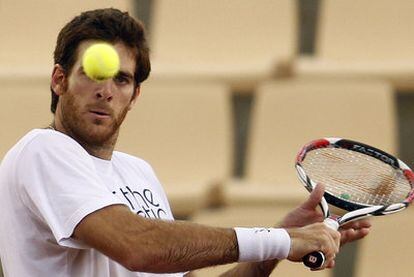Davis Cup showdown: "It's clear they want to pay us back"
Spain and Argentina will vie for the coveted trophy in a repeat of the 2008 final
Argentina coach Tito Vázquez sprang a surprise in the draw for this weekend's Davis Cup final when he elected to pit Juan Mónaco against Spain's top-ranked player, Rafa Nadal, in the opening rubber in place of David Nalbandian. Vázquez's idea, backed by Mónaco's recent results in reaching the final in Valencia and the quarterfinals in Paris, is to keep the world number two on court for as long as possible on Friday to exploit the weariness Nadal displayed at the World Tour Finals after a testing season for the world number two who has not reaped a title since Roland Garros in June.
Nalbandian, it is widely expected, will take the place of Mónaco in Sunday's final match, the reverse rubber against world number five David Ferrer. Currently ranked at 64, the former world number three has suffered a pair of injury-ravaged seasons and is being held in reserve should the tie go down to the wire. Nalbandian will play the doubles rubber alongside Eduardo Schwank on Saturday. "Compared to the singles, doubles is Spain's weakest point," noted the 2002 Wimbledon finalist.
In the second singles match on Friday, Juan Martín del Potro will take on Ferrer. The world number 11, who has climbed back up the ranking from a low of 484 last February after a wrist injury, holds a 2-2 record against Ferrer and has won their last two meetings, although they have never before played on clay.
"I have some very good memories of the 2004 final," Nadal said during the draw at Seville's Lope de Vega theatre on Thursday. "It was my first great triumph and it's really nice to be back here." On that occasion, an 18-year-old Nadal, ranked 51, recovered from a set down to defeat world number two Andy Roddick in the second singles rubber in four sets. Today, neither of Spain's top two has lost a Davis Cup match on clay, Nadal boasting a 14-0 record and Ferrer 11-0. Nadal, incredibly, has only ever lost one five-set match on his favored surface, against Robin Söderling at the 2009 French Open.
Spain is seeking its fifth Davis Cup title in 11 years, while Argentina is gunning for its first - and some closure after a calamitous home final against the same opposition in 2008 when Del Potro and Nalbandian fell out over the location to host the tie. "That's in the past, completely in the past," Del Potro said this week. "After that final, we grew up. It's going to be different than Mar del Plata, if we are in good shape and remain focused."
Fernando Verdasco, who forms Spain's doubles pairing with Feliciano López, gave short shrift to the notion Argentina is not out for revenge. "They were at home and favorites and it's clear they want to pay us back. But we are preparing as if we had never won it before," the player who won the decisive rubber in Mar del Plata said. In three meetings Argentina has never beaten Spain, which was victorious in the quarterfinals in 1926, the last four in 2003 and that 2008 final.

A devastating battle of egos
On the red clay of Seville's La Cartuja arena, Argentina's Davis Cup team is seeking to throw off the shackles of an historical debt. The albiceleste is seeking its first Davis Cup after three losing finals, in 1981, 2006 and 2008. In the most recent attempt, in Mar del Plata, David Nalbandian and Juan Martín del Potro spearheaded a team with home advantage and an opponent missing its top-ranked player, then-world number one Rafa Nadal. But a clash of egos and the intense pressure on Argentina to deliver led to a 1-3 loss, and Spain's first Davis Cup triumph on foreign soil.
"We all played with that pressure," says José Luis Clerc, who played in the 1981 final against the USA. "It was even worse for [Guillermo] Vilas. The whole country stopped for the first match, as it does for the soccer. It will be the same for this final."
"In Argentina, the Davis Cup is something special because it's pretty much the only thing left to win," says Sebastián Fest, author of a book on the 2008 débâcle. "Spain was without Nadal and the final was at home. But instead of being a spur, everybody failed in some essential way. It was the perfect storm. It became a battle of egos, power and money. Del Potro saved Argentina in the semifinals against Russia and the discussion about bonus money began. He was getting a fifth of what Nalbandian was for the final. Del Potro's father made it clear this wasn't on and a fight began."
The host city also became a sticking point: "Nalbandian wanted it in Córdoba, but the government wanted Mar del Plata. This didn't go down well with Nalbandian, who threatened not to play." Furthermore, the choice of surface was to Nalbandian's liking, but not Del Potro's. "The team didn't know what it wanted. The captain [Alberto Mancini] was weak." Far from home and on Spanish clay, Argentina is so far showing a more united front - even if Nalbandian and Del Potro are still barely on speaking terms.










































